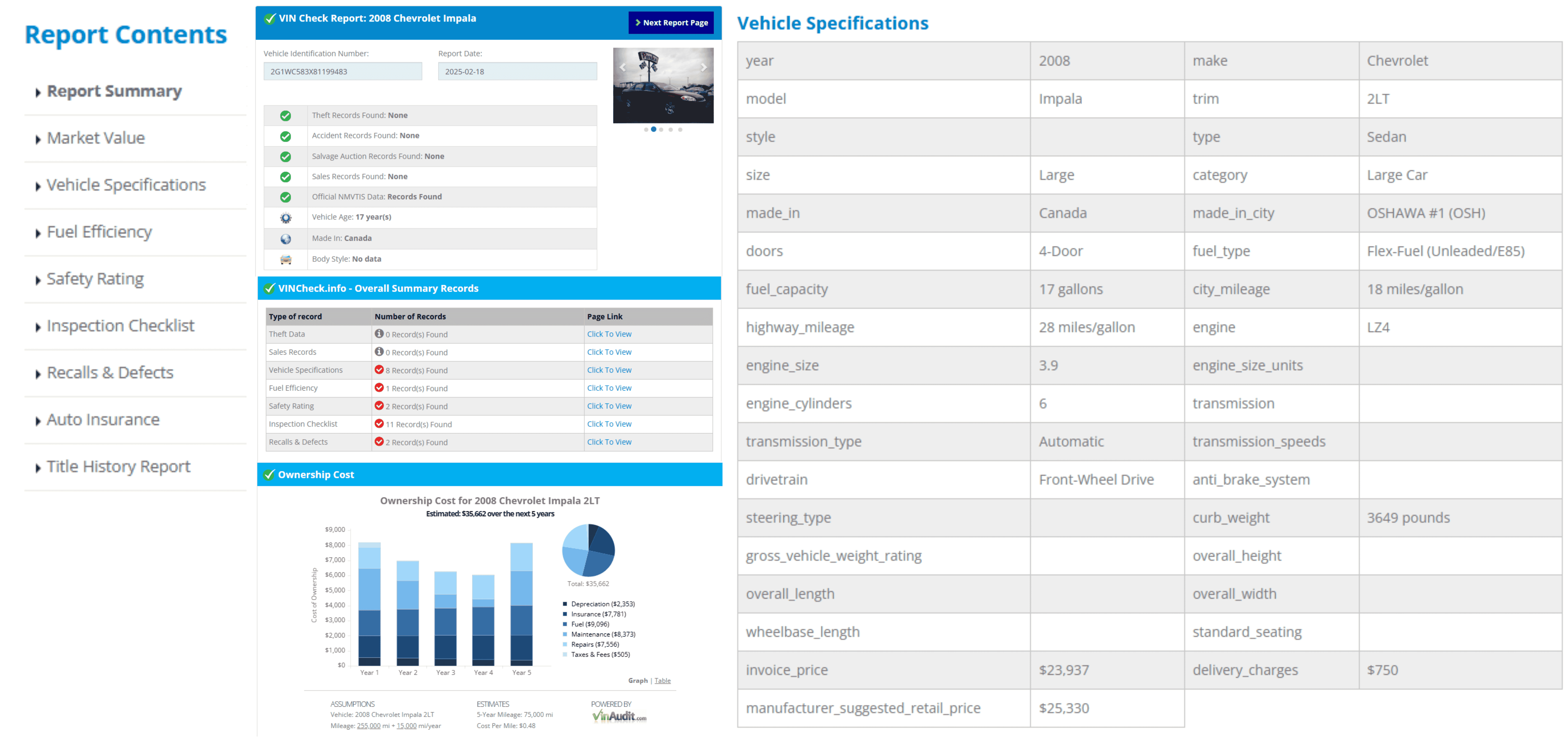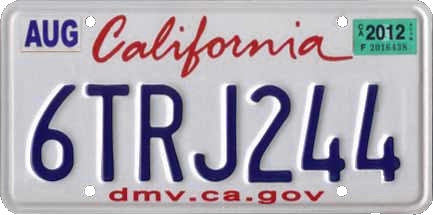Free California License Plate Lookup – Check CA Tag & Vehicle Info
Check Vehicle History by Plate Number – No VIN Required
Want to uncover a car’s full background using just the plate number? Our California License Plate Lookup tool provides instant access to vital vehicle history details—for free. It’s the smart way to verify a car before buying or selling in the Golden State.
Whether you’re using a CA DMV license plate lookup or exploring private listings, this guide will show you how to spot red flags and avoid costly mistakes using a trusted license plate lookup California service.
Why Use a California License Plate Lookup?
California has more than 35 million registered vehicles. That’s a huge number, and it means more chances for car scams. Some of the most common fraud tricks include:
- Title washing – Hides serious damage history (1 in every 325 used cars in the U.S. is affected)
- VIN cloning – Fake vehicle IDs used to sell stolen cars (costing millions each year)
- Odometer rollbacks – Over 450,000 vehicles a year show false mileage
A quick CA license plate lookup helps uncover these hidden problems. With a simple California plate check, you get the truth about a vehicle’s past—before making a costly mistake.
Did You Know?
What You’ll Discover with a CA License Plate Search
Explore essential insights with a California license plate search, whether you’re buying, selling, or just curious.
| Vehicle Specifications & Factory Equipment | Quickly verify the car’s make, model, trim, engine, transmission, and other key features. Ensure the specs match the ad before making any decision. |
|---|---|
| Accident and Damage History | Find out if the vehicle was in any accidents—major or minor—and whether airbags were deployed. This reveals structural damage that could affect safety or resale value. |
| Title Brands (Salvage, Lemon, Flood, etc.) | See if the car carries a branded title like “salvage,” “rebuilt,” “lemon,” or “flood.” These can signal hidden problems or past insurance claims that lower resale value. |
| Theft Reports | Avoid buying a stolen car. A CA license plate search reveals if the vehicle was ever reported stolen and whether it was recovered. |
| Lien & Repossession Records | Check if there’s still a loan tied to the car or if it was repossessed. Buying a car with an existing lien can lead to legal and financial issues. |
| Odometer Readings & Rollback Alerts | Spot mileage inconsistencies that may indicate tampering or fraud. Odometer rollbacks are common scams to inflate value—this check helps expose them. |
| Usage Type: Rental, Taxi, or Government | See if the vehicle was used as a rental, taxi, or police car. These vehicles may have higher wear and tear compared to private-use cars. |
| Sales History | Get a full sales timeline, including number of previous owners and where the vehicle was registered. Multiple quick transfers could raise concerns. |
Looking for a free license plate lookup California service? Our tool gives you a full picture—instantly.
Sample Vehicle History Report

How to Run a Free CA License Plate Lookup
Running a free California license plate lookup is quick and easy—no account or credit card required. Just follow these steps:
- Enter the California license plate number (e.g., 1ABC234)
- Select “California” as the state from the dropdown menu
- Click “Search License Plate” to access your free vehicle history report
💡 This tool works for standard, personalized, and specialty plates issued by the California DMV.
California DMV License Plate Laws & Requirements
1. Front and Rear Plate Display
- Requirement: Most vehicles in California must display both front and rear license plates.
- Exceptions: Motorcycles and certain classic cars (usually 1975 and older) may qualify for exemptions.
- Mounting Tips: Plates must be securely fastened and clearly visible from a reasonable distance.
2. Validation Sticker Placement
- Placement: Place the current registration sticker on the rear plate, top right corner.
- Tip: Check your registration renewal annually to ensure the correct tag year is displayed.
- Avoid fines: Improper or missing stickers may result in fix-it tickets or citations.
3. Vanity and Special Interest Plates
- Customization: California allows personalized and special interest plates with approved formats.
- Rules: No offensive language, limited characters, and spacing/symbol restrictions.
- Approval: Use the California Tag Lookup System to check if your vanity plate is available before applying.
4. Penalties for Non-Compliance
- Fines: Driving with missing plates or expired tags may result in fines or towing.
- Fix-it Tickets: Many violations can be corrected and dismissed after proof of compliance.
- DMV Enforcement: Officers may pull you over solely for plate-related violations.
California License Plate Formats and Types
Understanding the different California plate formats helps you recognize standard issues, custom designs, and plates with special privileges. Here’s a breakdown of the most common types:
Standard Format – 1ABC234
 This is the default DMV-issued plate for most passenger vehicles in California.
This is the default DMV-issued plate for most passenger vehicles in California.
- Format: One digit, three letters, then three numbers (e.g., 1ABC234)
- Style: White background, blue letters, red “California” script
- Issued By: Sequentially by the California DMV
You’ll see this format on the majority of cars, SUVs, and light trucks across the state.
Special Plates – Legacy, Environmental, Veteran
Specialty license plates go beyond the standard issue and often feature custom designs or support meaningful causes. Popular categories include:
Legacy Plates
- Styles: Retro black, blue, or yellow
- Inspired By: California plates from the 1950s–1980s
- Vehicle Type: Often used on classic or vintage vehicles
Environmental Plates
- Purpose: Raise awareness or support for conservation, clean air, or endangered species
- Designs: May include mountain ranges, whales, or trees
Veteran & Military Plates
- Eligibility: U.S. military service members or veterans
- Designs: Feature branch logos, medals, or war-specific tags (e.g., Vietnam Veteran)
- Benefits: May offer DMV fee waivers or special parking privileges
➡️ Apply for California specialty plates
Vanity Plates – Personalized Letters/Numbers
Custom messages with up to 7 characters. Check availability using the CA DMV license plate lookup portal.
- Character Limit: Up to 7 characters (letters, numbers, or select symbols)
- Requirements: Must be DMV-approved and not offensive or misleading
- Use Cases: Names, slogans, humor, or business branding
📝 Example: “GO2BEACH”, “EV4U”, or “GRNENER”
Disability Plates & Tags
California offers disability license plates and placards to qualified drivers or caregivers.
- Features: Wheelchair accessibility symbol
- Plate Type: Can be applied to standard or special plates
- Privileges: Access to disabled parking zones and exempt meters
Eligibility requires medical certification and California DMV approval.
California License Plate Owner Lookup – What’s Allowed?
Want to perform a California license plate lookup owner search? Here’s what you need to know:
What You Can Access:
- Ownership history – See how many people have owned the vehicle and when ownership changed.
- State registration history – Review previous registrations to ensure there are no gaps or red flags.
- Title transfer records – Confirm the timeline and status of each transfer of ownership.
What You Cannot Access (Due to DPPA Compliance):
- Names or addresses of current or past vehicle owners
- Phone numbers or personal contact info
Although California license plate lookup owner tools don’t reveal personal details, they still offer a smart way to verify a vehicle’s background. For buyers, this is key to confirming that a seller’s claims match up with official records.
Where Our Data Comes From
At VinCheck.info, our goal is to provide a comprehensive and reliable vehicle history report by leveraging data from the most authoritative sources. We continuously compile information from government agencies, non-profit organizations, and industry partners to ensure our reports are accurate and up-to-date. Here’s where VinCheck.info CA license plate lookups get their data:
1. National Motor Vehicle Title Information System (NMVTIS)
The NMVTIS is a nationwide database that state DMVs, insurance companies, and salvage yards are legally required to report to. With over 40 million records from more than 9,000 sources, the NMVTIS provides critical information on vehicle titles, salvage history, and theft records.
2. National Highway Traffic Safety Administration (NHTSA)
The NHTSA is the federal agency responsible for traffic safety in the United States. It aggregates data on vehicle safety complaints, airbag deployments, odometer fraud, and recalls, offering valuable insights into potential safety risks.
3. Federal Motor Carrier Safety Administration (FMCSA)
The FMCSA, a branch of the U.S. Department of Transportation, focuses on motor carrier safety. It provides information on commercial vehicles, including accident records, inspection events, and safety ratings.
4. Other Government Agencies and Industry Partners
VinCheck.info also collaborates with additional state-level agencies and industry leaders to enhance its reports by providing:
- Accident Records: Detailed accident data from state-level agencies.
- Lien Information: Open lien and financial obligation records from major lenders.
By sourcing data from these trusted authorities, VinCheck.info ensures that you receive detailed and reliable information, helping you avoid hidden vehicle issues and make confident, informed decisions.
Frequently Asked Questions
Can I get the owner's name or address in California?
No, you cannot access personal information such as the vehicle owner’s name or address due to the federal Driver’s Privacy Protection Act (DPPA). This law safeguards the privacy of registered vehicle owners and restricts access to sensitive data. Only approved entities like law enforcement agencies or licensed investigators with a legitimate purpose may access such records, even when using a California license plate search or California plate check tool.
Is VinCheck.info’s license plate lookup really free?
Yes, VinCheck.info offers a free license plate lookup California service that provides access to basic vehicle history information. You don’t need to sign up, enter a credit card, or commit to a subscription to use the free reports. It’s a no-strings-attached tool designed to help users conduct a free California plate lookup to check vehicle specs, title records, and recall history with ease.
Is it legal to lookup a license plate in California?
Yes, performing a California tag lookup or license plate search is legal as long as you follow all applicable laws. The information must not be used for illegal purposes such as identity theft, stalking, harassment, or unsolicited marketing. Responsible use includes verifying ownership, checking vehicle history before purchase, or confirming title status using a trusted California license plate search tool.
What if I find a stolen or salvage title?
Discovering a stolen or salvage title through a California plate check is a serious red flag. These vehicles may have hidden damage, compromised safety, or limitations on registration and insurance. If you’re still considering the vehicle, have it thoroughly inspected and ensure all documentation is in order before proceeding.
Is a Front License Plate Required in California?
Yes, California law requires that all standard passenger vehicles display both a front and rear license plate. Whether you’re using a California tag lookup or checking compliance manually, the plates must be clearly visible and properly mounted. Obstructing or altering a plate in a way that hides its information is a legal violation.